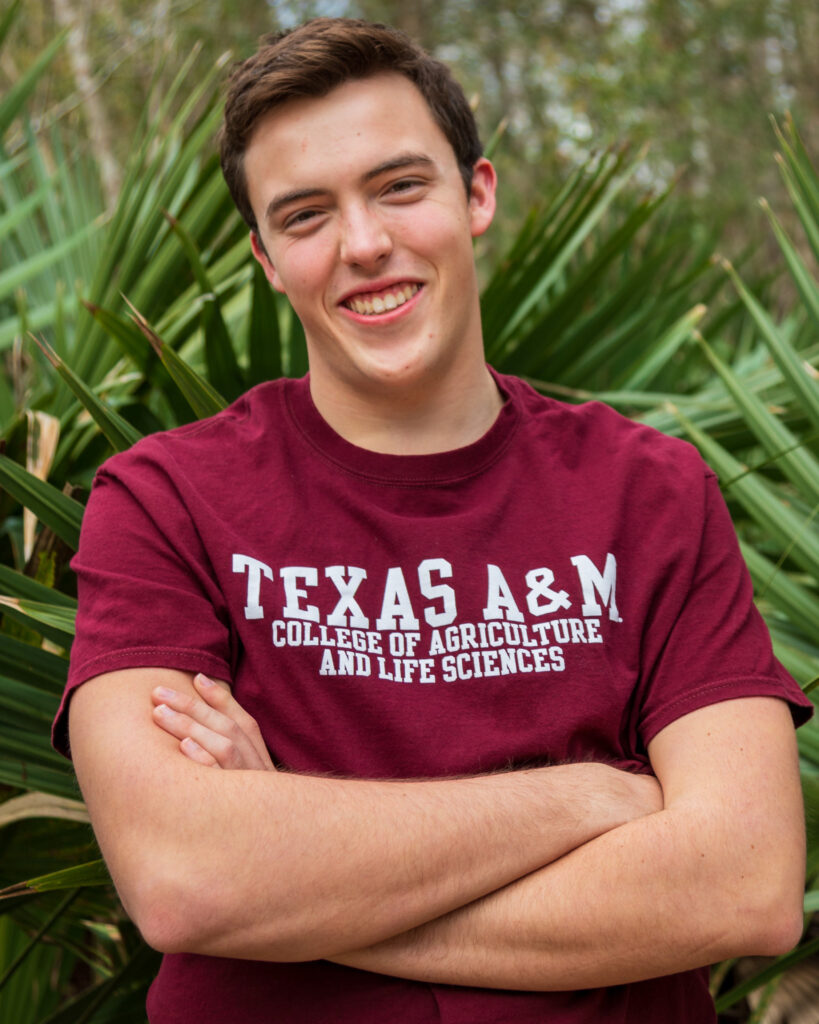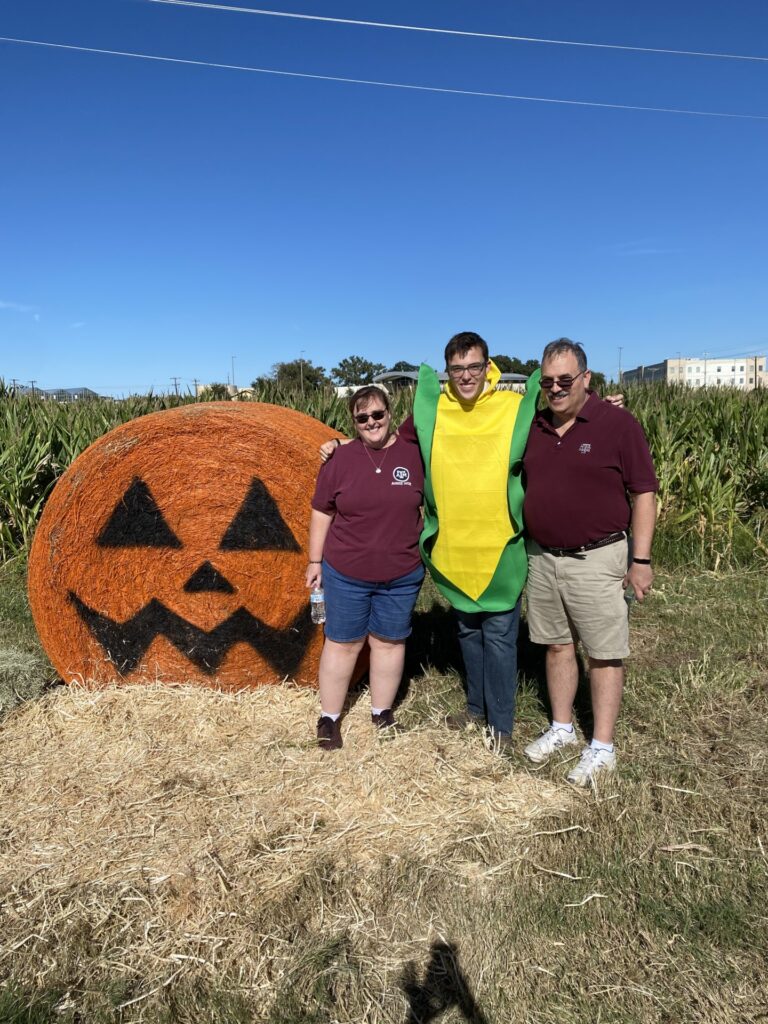A student’s path to agriculture and excellence
Plant and environmental soil science student reflects on his growth in the program
Chris Barron ’24, plant and environmental soil science major, is a shining example of the students in the Texas A&M College of Agriculture and Life Sciences’ Department of Soil and Crop Sciences.

The department is full of students who are eager to learn and grow within their academics and the community that surrounds them on campus. It is a community that has welcomed students like Barron with open arms and surrounded them with opportunities.
“No other university has a student culture like Texas A&M University,” said Barron.
Barron, a recent nominee by Texas A&M to the Astronaut Scholars Fellowship, shares his experiences and involvement in the department that led to this nomination and are shaping his future career in agriculture.
What made you want to be part of the Texas A&M College of Agriculture and Life Sciences? Why plant and environmental soil science?
Looking back, I do not think anyone would have thought I would end up in agriculture. It was not until eighth grade that I discovered my passion for agriculture after starting a garden in my backyard. From then on, I have been obsessed with plants.
During high school, I was planning on becoming an engineer. However, after a recommendation from my academic advisor, I attended the Global Youth Institute, GYI, hosted by the World Food Prize. This completely changed my perspective on agriculture and my education plans.
At the GYI, I learned about the severity of food security issues worldwide. I was able to meet and learn from professionals who had devoted their careers to research or politics to try and address these issues. I immediately knew this was the career for me, and plant and environmental soil science was the degree that most aligned with my career goals.
Choosing Texas A&M was much easier than picking my major because of the College of Agriculture and Life Sciences’ world-renowned faculty and staff.
I was most impressed by the volume of research that faculty members within Texas A&M AgriLife Research conduct compared to other universities. No other university comes close to matching their volume.
What is the most memorable experience you have had with the people in your major?
My time in the Department of Soil and Crop Sciences has been incredible. My major-specific classes have been the ones I enjoyed the most.
Two of my favorite classes thus far have been Problem-Solving in Plant and Soil Systems, taught by Dr. Katherine Carson, Ph.D., assistant professor, and Principles of Crop Production, taught by Dr. Wayne Smith, professor and associate department head.
Problem-Solving in Plant and Soil Systems introduced me to plant and environmental soil science. This discussion-based class taught me about some of the misinformation in agriculture that makes our jobs as researchers much harder. Principles of Crop Production was one of my favorite classes partially because of my love of the subjects covered in the class, paired with the wealth of knowledge Dr. Smith offers from his long career as a plant breeder and professor.
However, the highlight of my time in the department has been my participation in the Agronomy Society. This social and professional club mainly includes students studying plant and environmental soil science, turfgrass science and horticultural sciences.

Our club is best known for the corn maze we host every fall. Our corn maze is a fun event that connects the surrounding community and Texas A&M, giving them both exposure to agriculture that is often lacking. I have had the pleasure of serving as the maze mascot and corn man for the last two years.
In addition to the corn maze, the Agronomy Society is a local chapter of the National Society of Students of Agronomy, Soils and Environmental Sciences, SASES. Our club has attended the fall national convention for the last three years, where students can present research, compete in competitions and meet other students from around the country.
Because of my involvement with the Agronomy Society, I also served as the vice president of SASES last year and am the current national president. This has been a great opportunity, and I believe it will be one of the highlights of my college career.
What advice would you give future students pursuing the same degree as you?
I would encourage them to take every opportunity offered and to make opportunities for themselves, too. Their time in plant and environmental soil science will be as unique as they make it. It’s important for students to take advantage of the numerous opportunities presented in our degree.
Students should also not be afraid to get involved with undergraduate research during their freshman or sophomore years and should also apply for an internship their first summer. These are developmental experiences that can put you ahead of others and prepare you for more considerable prospects in the future.
I would also add to the student body in general that you are not limited to the classes in your degree plan. So, add that western dancing or barbecue class to your schedule. There will never again be an opportunity like this where you can learn about almost anything from a professional in that field, so take advantage while you can.
What does it mean to you to be an Astronaut Scholars Fellowship nominee?
Being nominated by the university for the Astronaut Scholars Fellowship, ASF, is an incredible honor. I never expected to achieve this much during my college career. I think this nomination is even more significant given the size of the student body at Texas A&M and the quality of the undergraduates at this university. Ultimately, this has shown me that my work in my undergraduate degree has not gone unnoticed.
This nomination has opened new opportunities for me that I had yet to consider regarding graduate school. However, I do not think this honor will entirely change my career path. Instead, I think it will help me stand out from other students and researchers when I begin applying for graduate school programs and when I first enter my career.
How has your coursework and experience in your major helped you on your journey to receive this recognition?
I do not think I would have received this recognition were it not for Dr. Carson and Dr. David Stelly, Ph.D., professor in the Department of Soil and Crop Sciences. These two individuals wrote letters of recommendation for my ASF application, and I believe their support played a significant role in my selection.
I met Dr. Carson on my first day of college in Problem-Solving in Plant and Soil Systems. Since then, she has been a great supporter of my undergraduate career, and I still work closely with her in the Agronomy Society and SASES. In addition, Dr. Stelly is the professor who I perform my undergraduate research with in the Beasley Cotton Cytogenetics Lab, and his mentorship has developed my abilities as a researcher.
Both individuals have hugely influenced my development as a student, researcher and leader, and my college career would be drastically different without their mentorship.
Beyond those two individuals, I have received support from many other professors and faculty members within the College and the department. This community of support has motivated me to a higher level of academic excellence throughout my time as an undergraduate. Every experience since my first day of college has developed me into the individual I am today. The collective experiences, from the classroom to the field and the lab, are what have made me successful as a student.
What are your career goals and how do you hope to use what you have learned in your major?
I hope to earn a doctorate in either plant breeding or genetics, and then plan to work for a company as a plant breeder. I am currently interested in developing stress-tolerant crops, specifically drought stress resistance, and crops that have improved nutrition. I hope to develop crops that can be used in impoverished areas like sub-Saharan Africa, where food insecurity is a serious issue.
Recently, I have developed the conviction that I would enjoy being a professor, so I would like to return to a university to perform research and teach eventually. Research at a university level will give me more freedom when choosing the topic I want to study. Moreover, my experience in a corporate position will make me a better mentor to students because of my wider range of experience.
My goal is to help feed the world, either directly through my work as a researcher or by developing the next generation of scientists to solve the new problems that agriculture will inevitably encounter.
In your opinion, what makes the Department of Soil and Crop Sciences stand out from others?
The faculty and staff in the Department of Soil and Crop Sciences are what makes the department and majors stand out. Everyone from the academic advisers to the professors are eager and willing to work with students to ensure they will have a great undergraduate experience and successful career. The degree programs are incredibly flexible, and the advisers are great about helping students tailor their degree plans to their career goals.
Any professor you have will remember your name and want to know how you are doing when you see them on or off campus. Also, our advisers constantly send out information for student worker positions, research, internships and scholarship opportunities. Our department is a community devoted to the success of each student, and I think that is hard to find anywhere else.


